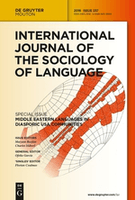
International Journal of the Sociology of Language
Scope & Guideline
Illuminating the Sociological Dimensions of Linguistic Practices
Introduction
Aims and Scopes
- Sociolinguistic Analysis:
The journal focuses on the sociolinguistic dimensions of language, examining how language varies and changes in different social contexts, including factors such as class, race, gender, and identity. - Language and Identity:
A significant emphasis is placed on the intersection of language and identity, exploring how language practices contribute to the construction of personal and group identities across various cultural and social settings. - Language Policy and Planning:
The journal investigates language policies and their implications for multilingual societies, looking at how language ideologies affect educational settings, migration, and community engagement. - Discourse Analysis:
Research published in the journal often employs discourse analysis to understand how language functions in social interactions, media, and institutional contexts, revealing the underlying ideologies and power relations. - Cultural and Historical Contexts:
The journal emphasizes the importance of historical and cultural contexts in understanding language use, particularly in postcolonial and diasporic situations, thereby contributing to a more nuanced understanding of global linguistic practices.
Trending and Emerging
- Raciolinguistics and Language Justice:
There is a notable increase in research focusing on raciolinguistics, examining how race and language intersect to shape social inequalities and advocating for linguistic justice in various contexts. - Mobile and Transnational Identities:
Emerging themes around mobile and transnational identities reflect the realities of globalization, migration, and diaspora, emphasizing the fluidity of identity and language in contemporary society. - Digital Communication and Language:
The impact of digital communication on language practices is increasingly highlighted, with studies exploring how social media and online interactions reshape language use and identity construction. - Language and Mental Health:
Recent works are exploring the connections between language and mental health, particularly in relation to marginalized communities, indicating a growing awareness of the psychological dimensions of language use. - Interdisciplinary Approaches to Language:
There is a trend towards interdisciplinary research that incorporates insights from fields such as anthropology, psychology, and political science, enriching the sociolinguistic discourse with diverse perspectives.
Declining or Waning
- Traditional Language Maintenance Studies:
Research that primarily focuses on traditional language maintenance without considering the socio-political implications has become less frequent, as scholars increasingly incorporate critical perspectives on language use in diverse contexts. - Static Language Ideologies:
The exploration of static or monolithic views of language ideologies appears to be waning, with a growing preference for dynamic and intersectional approaches that account for the complexities of linguistic practices in contemporary societies. - Narrowly Defined Linguistic Communities:
Studies focusing exclusively on narrowly defined linguistic communities without considering broader social, political, or economic factors are becoming less prevalent, as interdisciplinary approaches gain traction.
Similar Journals
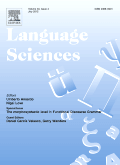
LANGUAGE SCIENCES
Transforming Understanding Through Language SciencesLANGUAGE SCIENCES, published by Elsevier Science Ltd, stands as a prominent journal in the field of linguistics and language studies. With an impressive impact factor that solidifies its reputation, it holds a Q1 ranking in both the linguistics and language categories for 2023, reflecting its excellence and relevance in cutting-edge research. Since its inception in 1979, this journal has evolved to encompass a wide range of interdisciplinary studies, providing a platform for innovative research that addresses the complexities of language use, acquisition, cognition, and social interactions. The journal is hosted in the United Kingdom and features rigorous peer-reviewed articles that contribute significantly to both the academic community and practical applications in language-related fields. With access options tailored for a diverse range of readers and contributors, LANGUAGE SCIENCES invites scholars, students, and professionals to engage with its comprehensive body of work and contribute to the ongoing discourse in linguistics.
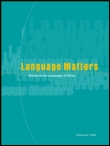
Language Matters
Delving into the Intersection of Language and HumanityLanguage Matters is a prestigious journal dedicated to the dynamic field of Linguistics and Language, published by Routledge Journals, Taylor & Francis Ltd in the United Kingdom. With an ISSN of 1022-8195 and an E-ISSN of 1753-5395, this journal serves as an essential platform for scholars seeking to explore the multifaceted relationships between language and society. Recognized in the 2023 Category Quartiles as Q2 in Linguistics and Language, it boasts impressive Scopus rankings, sitting at #298 out of 1088 in the Arts and Humanities category and #356 out of 1167 in Social Sciences, highlighting its significant impact on the field with a 72nd and 69th percentile ranking, respectively. The journal's scope encompasses a wide range of topics including language acquisition, sociolinguistics, and psycholinguistics, making it a vital resource for researchers, educators, and students alike. By not offering open access, it maintains a curated selection of high-quality peer-reviewed articles, ensuring that academic rigor and relevance are upheld for its readership. With a publication range spanning from 1993 to 2024, Language Matters continues to shape conversations and advance knowledge in the ever-evolving landscape of linguistic research.

Dialectologia
Unlocking the Secrets of Language Change and DiversityDialectologia, published by the Universidad de Barcelona, Facultad de Filología, is a distinguished academic journal dedicated to the fields of linguistics and language studies. Since its inception in 2008, this Open Access journal has made significant strides in disseminating knowledge, fostering scholarly communication, and promoting research in dialectology and sociolinguistics. With its current classification in the Q3 quartile of linguistics and language, and Scopus rankings placing it in the 32nd and 29th percentiles within the Arts and Humanities and Social Sciences, respectively, Dialectologia plays a crucial role in advancing the study of language variation and change. The journal’s commitment to providing a platform for innovative research is underscored by its accessibility to a wide audience, ensuring that researchers, professionals, and students alike can engage with and contribute to contemporary discourse in language studies. Based in Barcelona, Spain, Dialectologia not only enriches academic literature but also connects a global community of language scholars through its compelling and diverse contributions.

DEUTSCHE SPRACHE
Illuminating the Richness of German Linguistic ExpressionDEUTSCHE SPRACHE, published by Erich Schmidt Verlag, is a pivotal journal dedicated to the intricate study of the German language. With its ISSN 0340-9341 and E-ISSN 1866-5233, this publication serves as a vital resource for linguists, educators, and language enthusiasts alike. Spanning diverse topics within the fields of linguistics and language, psychology, and social sciences, the journal has earned a Q3 ranking in Linguistics and Language, alongside a Q4 ranking in both Psychology (miscellaneous) and Social Sciences (miscellaneous) as of 2023. Although the journal is not Open Access, it provides invaluable insights on the developments in German language research from its convergence years of 2002 to 2011 and 2017 to 2023. Positioned in Berlin-Tiergarten, Germany, DEUTSCHE SPRACHE continues to expand its influence and accessibility to researchers, professionals, and students keen on understanding the nuances of linguistic expression in the German language.
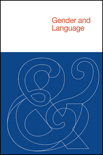
Gender and Language
Fostering Critical Conversations on Gender and LinguisticsGender and Language is a leading academic journal published by EQUINOX PUBLISHING LTD, focusing on the intersectionality of gender studies and linguistics. With an ISSN of 1747-6321 and an E-ISSN of 1747-633X, the journal has established itself as an essential resource for researchers and practitioners in the fields of gender, language, and philosophy, boasting impressive Scopus rankings, such as #62 in Philosophy and #139 in Language and Linguistics. Since its inception, it has significantly contributed to scholarly discourse on the dynamic interactions between gender and linguistic practices, aiming to promote a deeper understanding of how language shapes and reflects gender identities. With a current classification in the Q2 quartile in both Gender Studies and Linguistics, as well as a Q1 ranking in Philosophy, Gender and Language is a pivotal platform for innovative research and critical discussions. Based in the UK, this journal serves as a vital conduit for advancing knowledge in its domain, inviting contributions from scholars worldwide to explore the linguistic manifestations of gender in diverse contexts.
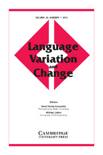
Language Variation and Change
Connecting Scholars Through Language VariationWelcome to Language Variation and Change, a prestigious journal published by Cambridge University Press and dedicated to the rigorous exploration of linguistic diversity and its evolution. With an ISSN of 0954-3945 and an E-ISSN of 1469-8021, this journal has been a pivotal platform for scholars since its inception in 1989, continuing to publish cutting-edge research up to 2024. Language Variation and Change is recognized in the top quartile for Linguistics and Language (Q1) and holds an impressive Q2 ranking in Education for 2023, underscoring its significant contribution to these fields. Its strong Scopus rankings—placing it in the 86th percentile for Arts and Humanities in Language and Linguistics—highlight its impact and quality. This journal aims to foster a deeper understanding of the dynamic interplay between language and society, making it essential reading for researchers, professionals, and students eager to engage with the latest findings and theoretical discussions in the arena of sociolinguistics. Stay connected with the evolving landscape of language studies through Language Variation and Change.

NEUPHILOLOGISCHE MITTEILUNGEN
Illuminating Contemporary Discussions in LanguageNEUPHILOLOGISCHE MITTEILUNGEN, published by the esteemed Modern Language Society, stands as a significant contribution to the domain of Language and Linguistics. With a history dating back to 1971, this journal has consistently provided an academic platform for researchers and scholars, navigating through the intricacies of philology and linguistic studies. Although it is indexed in Scopus with rankings reflecting its position in the Arts and Humanities and Social Sciences categories, it currently does not offer Open Access, which may require interested parties to seek institutional access for its wealth of content. The journal has experienced periods of coverage discontinuation in recent years, yet it remains a valued source for advancing the understanding of language theories and linguistic practices. Its location in Helsinki, Finland, offers a unique European perspective on global linguistic issues. The journal is ideal for those looking to engage with evolving linguistic trends and contribute to contemporary discussions in the field.

Langages
Unveiling the Power of Language in SocietyLangages is a premier peer-reviewed journal in the field of linguistics, published by Armand Colin, a reputable French publisher known for its commitment to advancing academic scholarship. With an ISSN of 0458-726X and an E-ISSN of 1958-9549, this journal has been an important platform for linguistic research since its inception in 1976, and it continues to engage with contemporary linguistic debates through to 2024. The journal is ranked in the top two quartiles for linguistics and language, reflecting its significance in the academic community, with a Q2 categorization in 2023, and robust Scopus rankings within the 66th to 69th percentiles across relevant categories. Authors and researchers from around the globe contribute to its rich tapestry of scholarly articles that explore the multifaceted nature of language and its role in society, making Langages an essential resource for linguists, educators, and students alike.
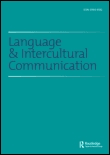
Language and Intercultural Communication
Exploring the Nexus of Language and CultureLanguage and Intercultural Communication is a leading peer-reviewed journal published by Routledge Journals, Taylor & Francis Ltd, based in the United Kingdom. With an ISSN of 1470-8477 and an E-ISSN of 1747-759X, this esteemed publication has established itself as a vital resource in the fields of Communication and Linguistics, boasting an impressive Q1 classification in both categories as of 2023. The journal's scope encompasses a broad range of topics related to language and its role in intercultural contexts, making it an essential platform for researchers, professionals, and students alike who wish to contribute to and learn from the latest scholarly discussions. Even without an open-access option, its high impact factor and strong Scopus rankings, which place it in the 87th percentile for Linguistics and Language, affirm its significance in shaping contemporary dialogue. As we move towards 2024, Language and Intercultural Communication continues to foster academic exchanges that challenge, expand, and enrich understanding across diverse linguistic and cultural landscapes, making it a must-read for anyone interested in the intersection of language and culture.
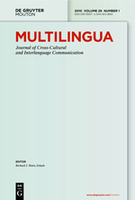
Multilingua-Journal of Cross-Cultural and Interlanguage Communication
Illuminating the Nuances of Interlanguage CommunicationMultilingua: Journal of Cross-Cultural and Interlanguage Communication is a premier academic journal published by DE GRUYTER MOUTON, specializing in the dynamic fields of communication and linguistics. Established in 1982, this journal has significantly contributed to the discourse surrounding multilingualism, intercultural interactions, and language acquisition, with a notable reputation backed by an impressive Q1 ranking in both Communication and Linguistics and Language for 2023. Positioned strategically at the heart of Germany, the journal serves as a vital platform for researchers, professionals, and students alike, fostering scholarly exchange and insights into cross-cultural communication practices. With rankings placing it in the top percentiles across key categories in Scopus, including Arts and Humanities and Social Sciences, Multilingua exemplifies the highest standards of academic excellence. Although currently not an Open Access journal, it continues to provide a wealth of knowledge to the global research community.